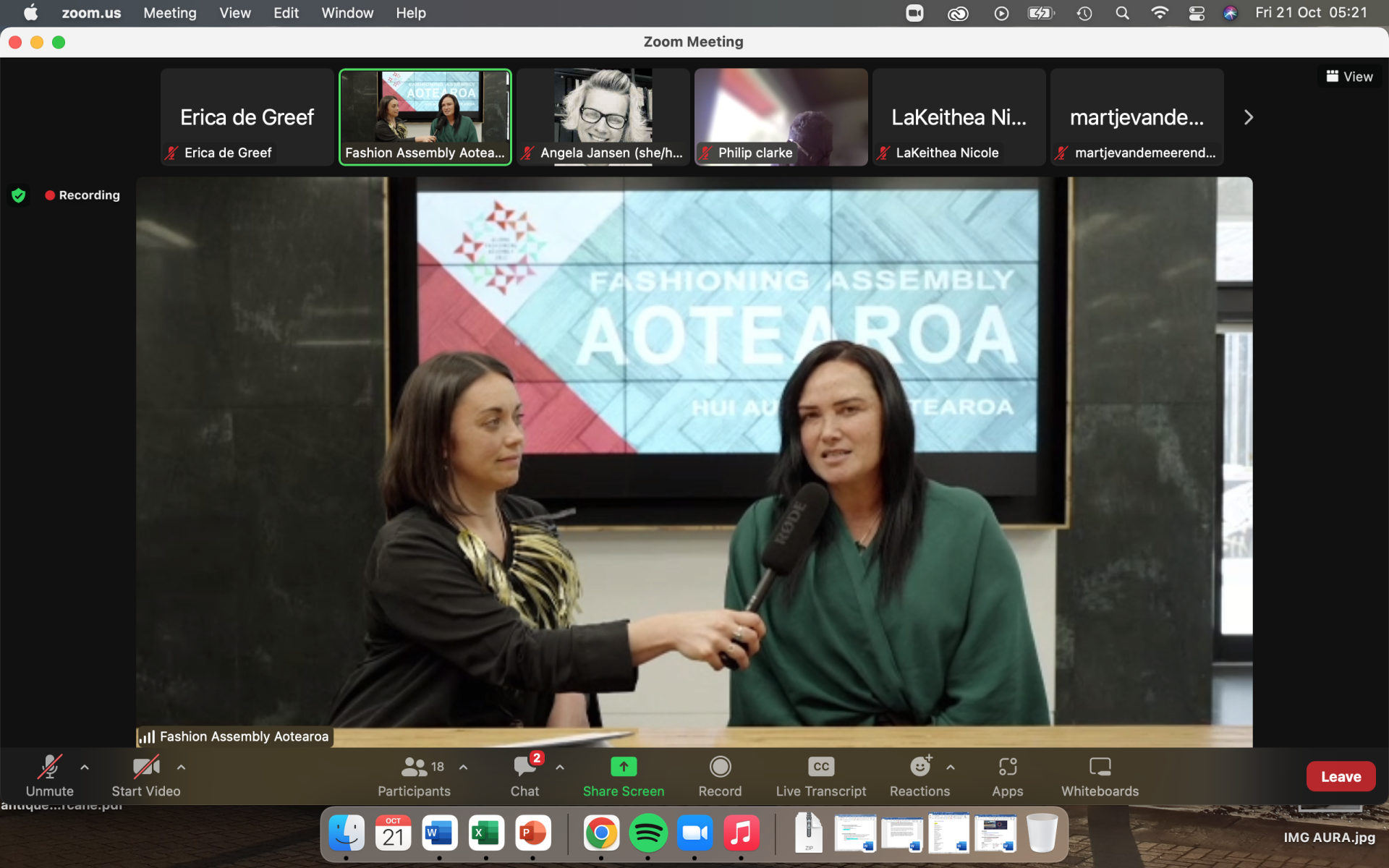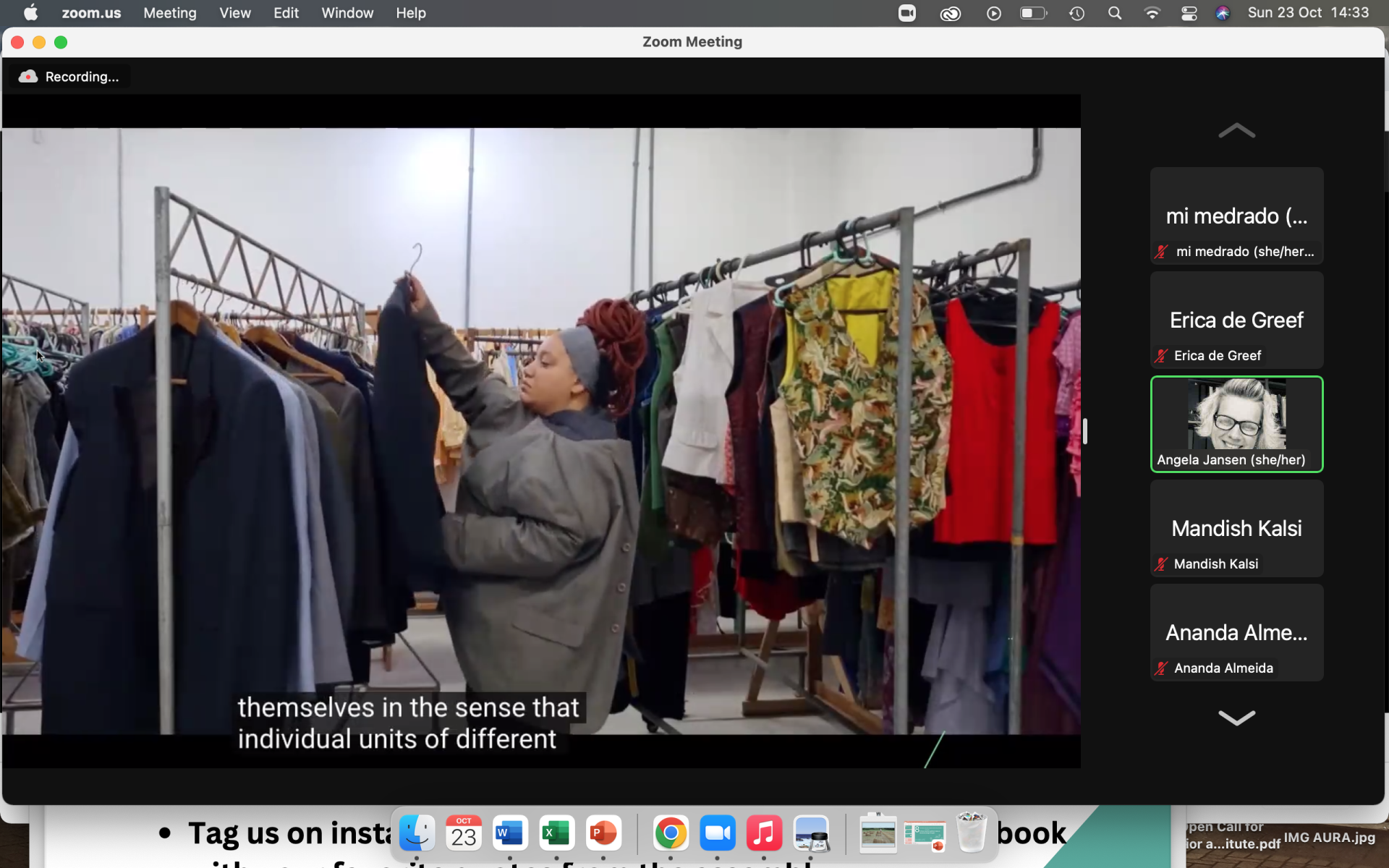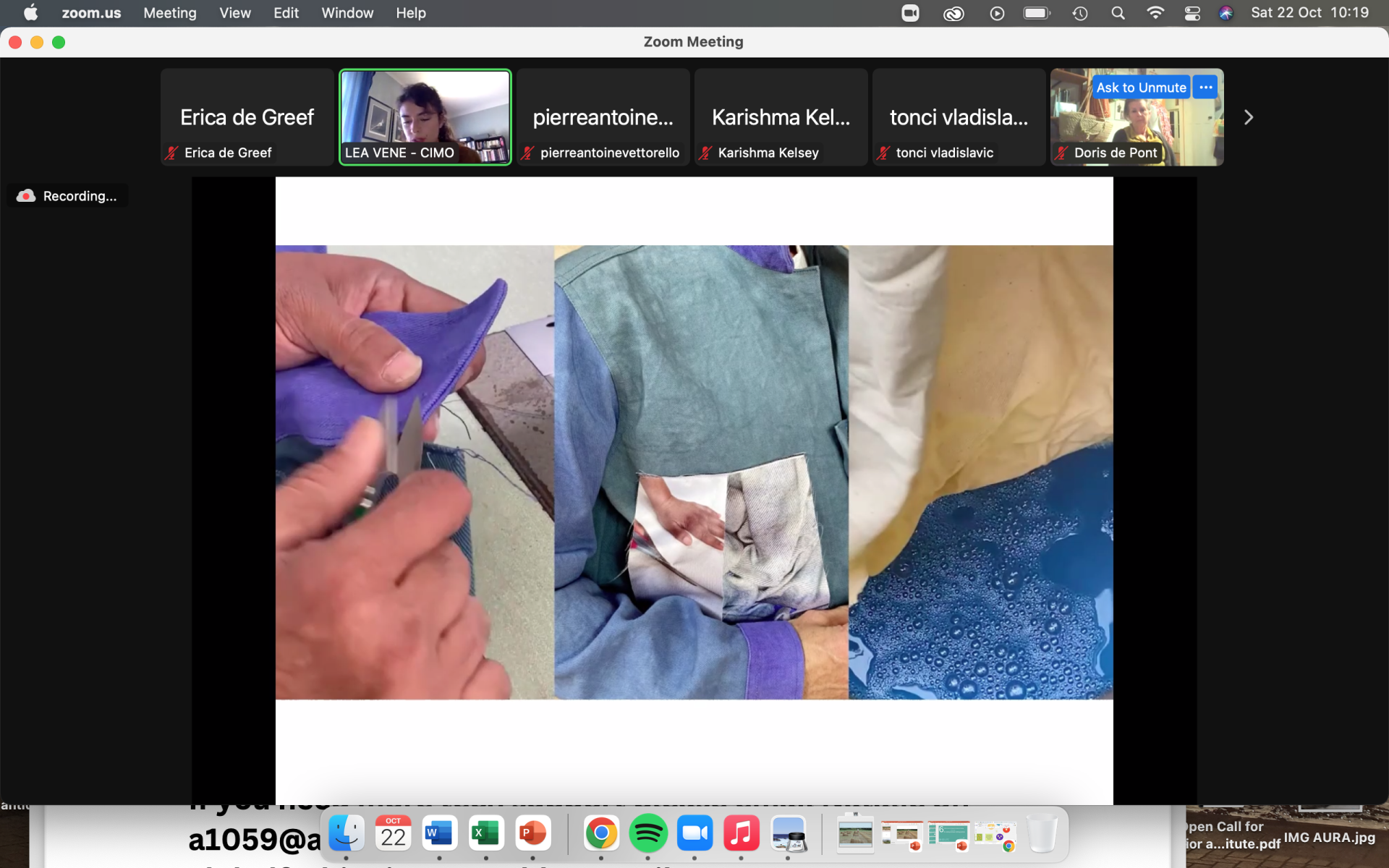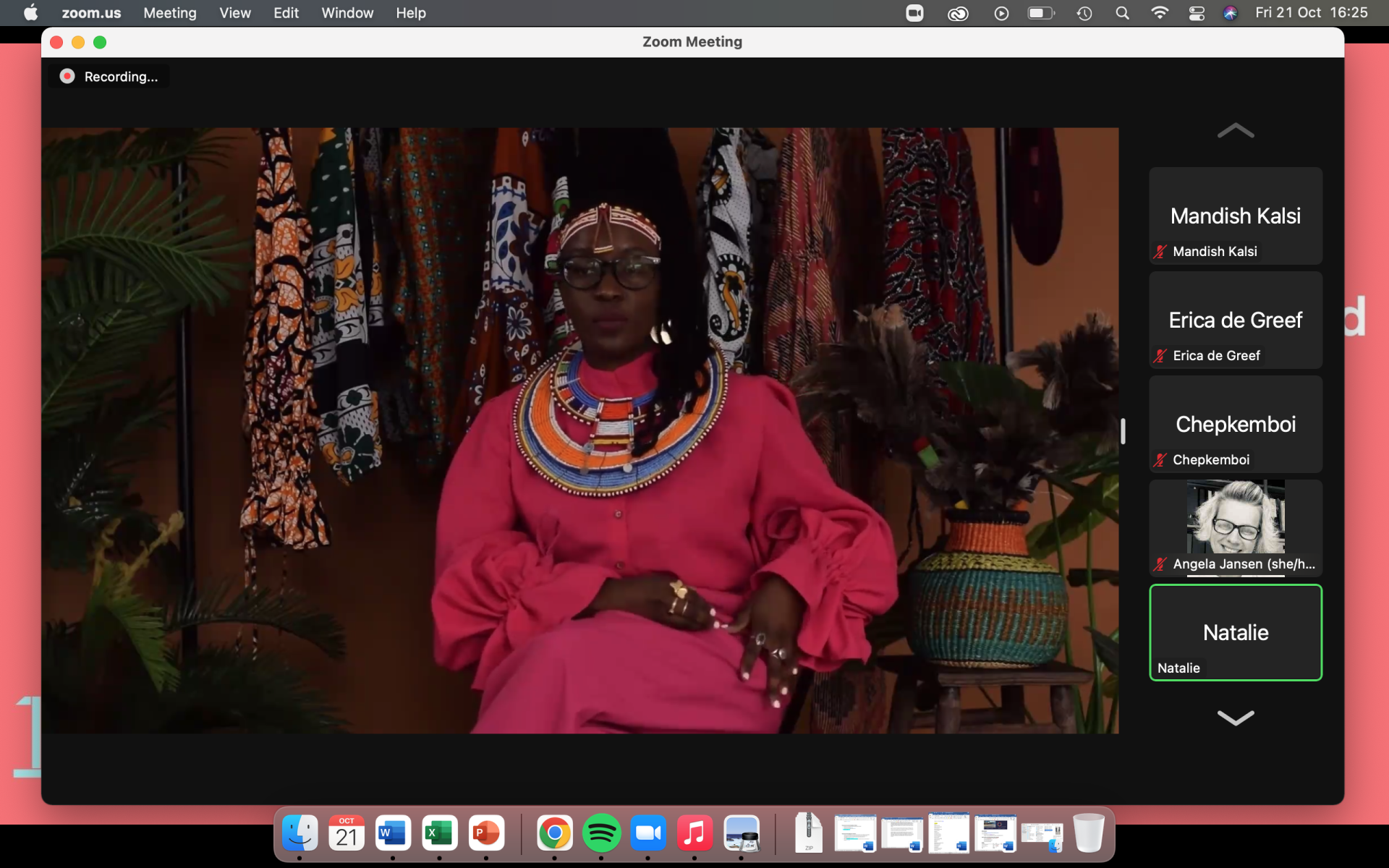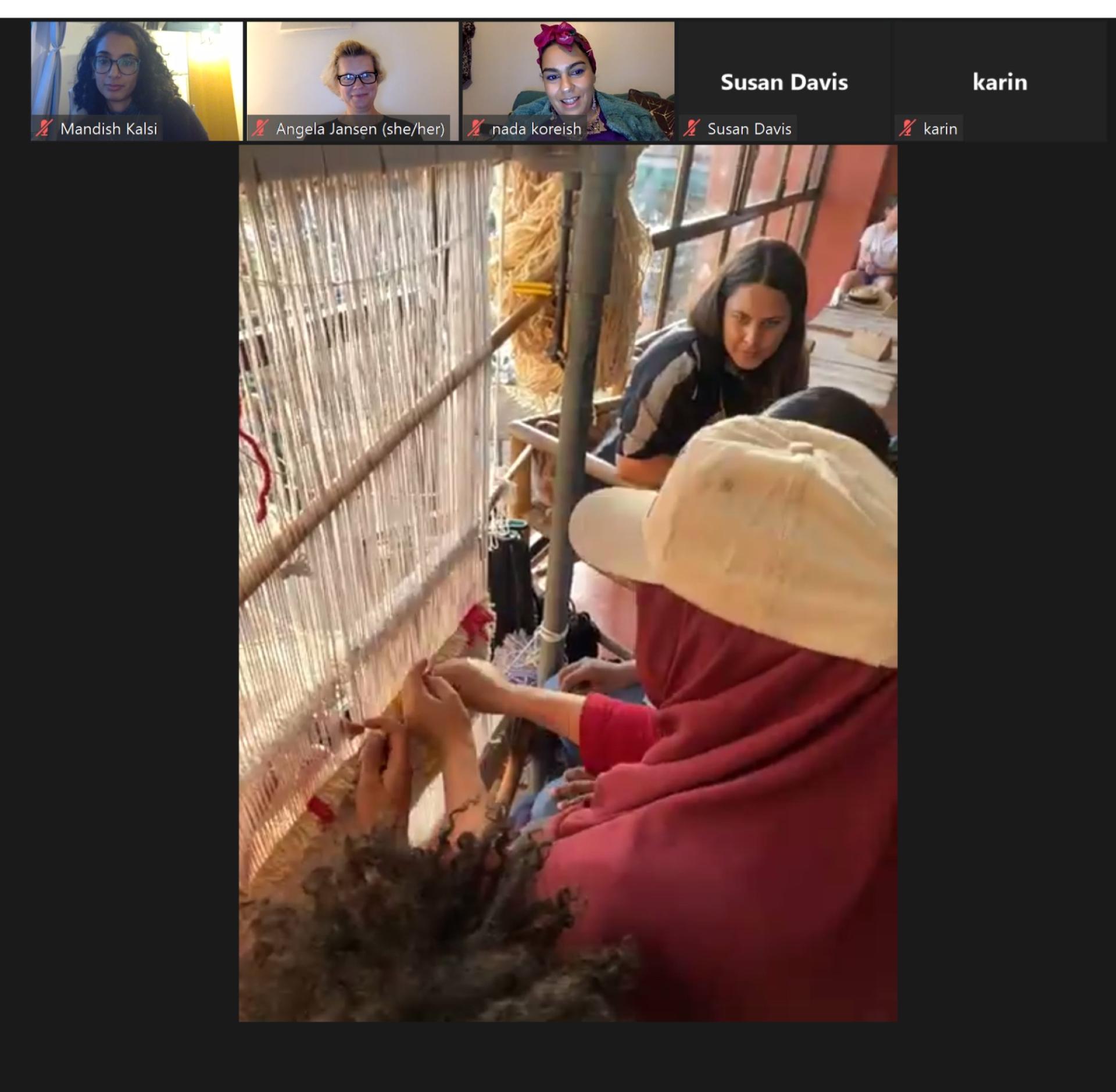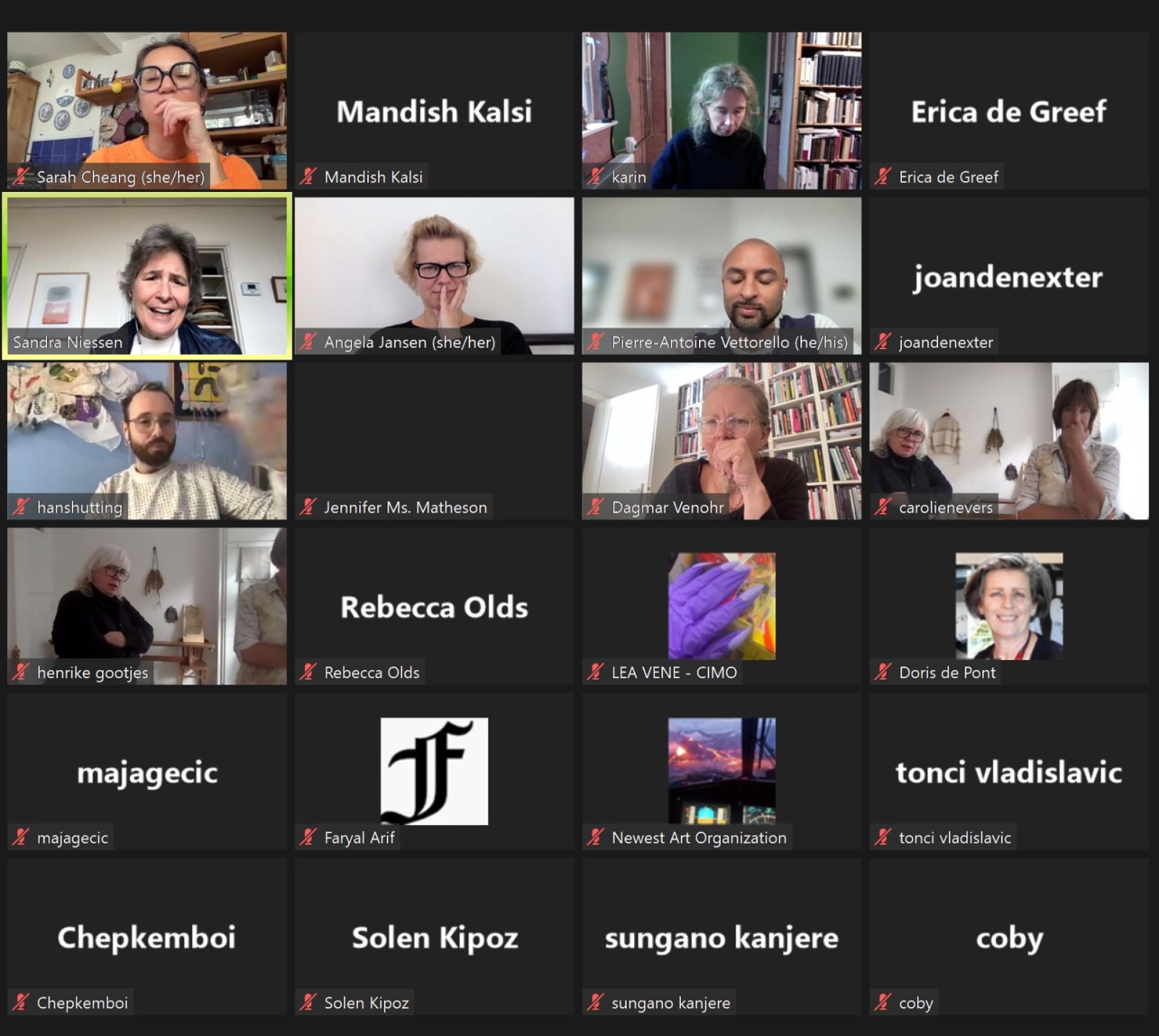Global Fashioning Assembly 2022
Basic information
Project Title
Global Fashioning Assembly 2022
Full project title
Global Fashioning Assembly 2022: Meeting in Difference
Category
Regaining a sense of belonging
Project Description
The Global Fashioning Assembly was initiated in October 2022 as a decolonial and decentral alternative to western-centric academic fashion conferences. The hosting is passed on from one coalition to the next to ensure self-determination, self-governance and self-representation. It is a fully collaboratively created event, founded on collective ideation, decision-making and implementation. Its first edition was hosted by 12 coalitions in 14 countries, across 6 continents, for a total of 40 hours.
Geographical Scope
Cross-border/international
Project Region
CROSS-BORDER/INTERNATIONAL: Croatia, Netherlands
Urban or rural issues
It addresses urban-rural linkages
Physical or other transformations
It refers to other types of transformations (soft investment)
EU Programme or fund
No
Description of the project
Summary
The GFA22 was hosted over three days by 14 coalitions, namely New Zealand Fashion Museum, Kazakhstan’s Born Nomad, Pakistan Collective for Decolonial Practices, African Fashion Research Institute, Kenya’s Own Your Culture, Croatian Centre for Research of Fashion and Clothing, The Linen Project and Research Collective for Decoloniality and Fashion in the Netherlands, Fashion Liberation Collective North Africa from Egypt, Morocco and Wales, Brazilian Fashion and Decoloniality Collective: Crossroads in the Global South, Ghana International Fashion Team, North Carolina Museum of Art and the Peruvian Awamaki Foundation. Hosting programmes, in a combination of online and offline, included talks, film projections, workshops, discussions, a performance and crafts, welcoming local communities and global online audiences, in local languages and English. All sessions were recorded and uploaded as part of an open-access archive.
We initiated the Assembly to stimulate systemic changes beyond content, by changing the framework in which global communities meet and exchange. Our primary target groups are the coalitions and their communities, to initiate local conversations and solutions for globally interconnected problems of racism, exploitation and destruction, while our secondary target groups are wider (fashion) communities worldwide.
Our achieved outcome in the category ‘regaining a sense of belonging’ is that the GFA opens dialogues with global territories largely denied access in fashion programming as a way to decentralise knowledge creation and sharing towards a pluriverse of fashioning systems and practices that offer different relationships to the environment, to time and to cultural heritages and knowledges. We encourage and support the restoration of a sense of belonging by supporting local communities to reconnect with local historical heritages, knowledges and traditions and as such, to restore agency, dignity and pride.
We initiated the Assembly to stimulate systemic changes beyond content, by changing the framework in which global communities meet and exchange. Our primary target groups are the coalitions and their communities, to initiate local conversations and solutions for globally interconnected problems of racism, exploitation and destruction, while our secondary target groups are wider (fashion) communities worldwide.
Our achieved outcome in the category ‘regaining a sense of belonging’ is that the GFA opens dialogues with global territories largely denied access in fashion programming as a way to decentralise knowledge creation and sharing towards a pluriverse of fashioning systems and practices that offer different relationships to the environment, to time and to cultural heritages and knowledges. We encourage and support the restoration of a sense of belonging by supporting local communities to reconnect with local historical heritages, knowledges and traditions and as such, to restore agency, dignity and pride.
Key objectives for sustainability
As a coalitional gathering that engages a global diversity of communities of practice, the GFA moves beyond institutional, disciplinary and geographical boundaries, with the objective to create a hosting environment that is decentred, self-represented and co-created. The Assembly activates a pluriverse of fashioning systems beyond the singular western system, and brings attention to body fashioning systems that fundamentally consider the planet and its people over profit. Whilst some coalitions presented programmes around decolonising narratives and critiquing institutional ideas and spaces, others interrogated the importance of cultural sustainability and craft heritage practices. A number of collectives also confronted the impact of politics, colonialism and erasure, presenting critical, decentered research. Our key objective is to continue to support and encourage a just transition to an ethical, regenerative and fair global fashion-scape and foster counter-strategies against political polarisation and extremism through fashion.
Joan Den Exter, the coordinator of The Linen Project and Dutch co-host of the GFA22 testified that “As a Sustainability consultant in the fashion industry, I've been wondering for a long time, what people in, among other things, the production countries think about how we have set up the fashion system and what changes they would like to see. Unfortunately, I don't often visit countries like India, China or Bangladesh, but through my assignments for 'commercial' companies I still see a dominant attitude of EU companies towards their production partners in Asian countries. That's why the first GFA was an eye opener for me and this assembly seemed to give the right words to my ideas and feelings. Now I can articulate this better and pass it on to others who come my way. My personal insight has been enriched by this participation. Many thanks for that!”
Joan Den Exter, the coordinator of The Linen Project and Dutch co-host of the GFA22 testified that “As a Sustainability consultant in the fashion industry, I've been wondering for a long time, what people in, among other things, the production countries think about how we have set up the fashion system and what changes they would like to see. Unfortunately, I don't often visit countries like India, China or Bangladesh, but through my assignments for 'commercial' companies I still see a dominant attitude of EU companies towards their production partners in Asian countries. That's why the first GFA was an eye opener for me and this assembly seemed to give the right words to my ideas and feelings. Now I can articulate this better and pass it on to others who come my way. My personal insight has been enriched by this participation. Many thanks for that!”
Key objectives for aesthetics and quality
Across the hosting programmes, three broad fields emerged in terms of aesthetics. The conversations hosted by Fashioning Assembly Aotearoa, the North Carolina Museum of Art, and the Ghana International Fashion Team explored decolonial critiques of institutional ideas and spaces. Cultural sustainability underpinned the programmes of Own Your Culture in Kenya, Born Nomad in Kazakhstan, the heritage practices supported by the Awamaki Foundation in Peru, and the call to re-existence of The Linen Project in the Netherlands. The third thread focussed on confronting the impact of global politics, colonialism and erasure, addressed by the Centre for Research of Fashion and Clothing in Croatia, the African Fashion Research Institute in South Africa, the Pakistan Collective for Decolonial Practices, the Fashion Liberation Collective North Africa in Morocco and Egypt, and the Brazilian Fashion and Decoloniality Collective. Together these conversations debunked the myth that the contemporary fashion system is universal and inclusive, and raised awareness of the violence of the system.
In terms of quality of experience, one participant Tejo M. remarked that “Having been involved with the New Zealand contribution in Auckland Library, my interest was raised in the rich and varied conversations the topic of decoloniality in fashion generates, while the practical responses of makers in the room highlighted a huge variety of issues around diversity, visibility, sustainability and collaboration. The interviews showed how much thought underpins the variety of practices on display. Later in the weekend, I spent many hours watching and listening to contributions from Ghana, the United States, and Peru. It was a total privilege to travel around the world and be invited into so many different realities and perspectives. Thank you to the organisers of this amazing opportunity to listen-in to the people of the world sharing their deep concerns and aspirations.”
In terms of quality of experience, one participant Tejo M. remarked that “Having been involved with the New Zealand contribution in Auckland Library, my interest was raised in the rich and varied conversations the topic of decoloniality in fashion generates, while the practical responses of makers in the room highlighted a huge variety of issues around diversity, visibility, sustainability and collaboration. The interviews showed how much thought underpins the variety of practices on display. Later in the weekend, I spent many hours watching and listening to contributions from Ghana, the United States, and Peru. It was a total privilege to travel around the world and be invited into so many different realities and perspectives. Thank you to the organisers of this amazing opportunity to listen-in to the people of the world sharing their deep concerns and aspirations.”
Key objectives for inclusion
The GFA’s guiding principles are deeply ethical, caring and culturally empowering. It is decentralised yet collective, working ‘in coalition’ towards one global event in terms of decision making, taking responsibility, listening, honouring, self-managing, leading and supporting, ensuring communal ownership of the project and its material and immaterial outcomes. Initiated by the Research Collective for Decoloniality and Fashion in the Netherlands, the Assembly’s principles are guided by the Dutch Cultural Diversity & Inclusion Code. This code ensures diversity at every level of decision-making, content, organisational planning, and audience reach to ensure that who is invited to speak, and in what forms these exchanges are shared, address the exclusionary gatekeeping of conventional academic spaces and projects. That is also the reason why there are no selection procedures for the GFA’s hosting communities, but instead communities are identified and invited collectively, through a network of networks.
The hybrid format allows local communities to gather while keeping our carbon footprint low, to bypass financial and visa barriers as well as language-based discriminations often at play in global academic conferences. Each hosting community is responsible for the collective and individual budgeting and funding, collectively deciding on how much is needed for each hosting programme. For example, while countries in the Global South face lower costs in terms of rent and transport, they also have less access to public funding opportunities. Therefore, it was decided collectively that hosting communities in the Global North and South receive a similar amount for their hosting programmes. Participation, both in person and online, is free although a voluntary donation is encouraged for those who can afford it. All materials are accessible open-access online, as a way to ensure ongoing and easily accessible materials for sharing and learning across borders.
The hybrid format allows local communities to gather while keeping our carbon footprint low, to bypass financial and visa barriers as well as language-based discriminations often at play in global academic conferences. Each hosting community is responsible for the collective and individual budgeting and funding, collectively deciding on how much is needed for each hosting programme. For example, while countries in the Global South face lower costs in terms of rent and transport, they also have less access to public funding opportunities. Therefore, it was decided collectively that hosting communities in the Global North and South receive a similar amount for their hosting programmes. Participation, both in person and online, is free although a voluntary donation is encouraged for those who can afford it. All materials are accessible open-access online, as a way to ensure ongoing and easily accessible materials for sharing and learning across borders.
Results in relation to category
The GFA22, with 14 communities and 40 hours of programming, 80 in-person attendees, 475 followers on Instagram, 40 on Youtube, and 754 unique visitors to our platforms by June 2023. There were 411 participants who registered on Eventbrite for the three-day event, with an average of 26 attendees per hosting programme. Some attendees joined only one programme, while others joined multiple programmes. Some coalitions held hybrid events, with New Zealand welcoming 80 in-person attendees, Kenya 25 attendees and North America 32 attendees. Attendees in person and online presented a wide range of ages, genders, professions and countries. Due to the coalitional structure of the GFA, all hosting communities ensured diverse participation within their programmes, with around 4-8 unique, self-representing voices in each session.
The fact that the programme lasted three days, with a total of 40 hours, in combination with the large time differences, made it difficult for most of the audience to attend more than one or two programmes. Therefore, many attendees asked when the recordings would become available, as they had to miss out on the live events in different time zones. By sharing the recorded open-access content online on Youtube and via our website, we envisage that they will continue to circulate in decolonial fashion education programmes and other artistic and academic platforms.
Outside of these measurable points, it is difficult to assess the true impact. We aim to reach the right people - rather than a lot of people - who are dedicated to disrupting, (un)learning and decolonizing through experimental and coalitional channels.
Community building and strong bonds created among all the hosting communities are forming a good base for the long-term project development and growth, and future growth is envisaged that decentres definitions of fashion, and promotes a pluriverse of future fashioning practices, economies and ecologies.
The fact that the programme lasted three days, with a total of 40 hours, in combination with the large time differences, made it difficult for most of the audience to attend more than one or two programmes. Therefore, many attendees asked when the recordings would become available, as they had to miss out on the live events in different time zones. By sharing the recorded open-access content online on Youtube and via our website, we envisage that they will continue to circulate in decolonial fashion education programmes and other artistic and academic platforms.
Outside of these measurable points, it is difficult to assess the true impact. We aim to reach the right people - rather than a lot of people - who are dedicated to disrupting, (un)learning and decolonizing through experimental and coalitional channels.
Community building and strong bonds created among all the hosting communities are forming a good base for the long-term project development and growth, and future growth is envisaged that decentres definitions of fashion, and promotes a pluriverse of future fashioning practices, economies and ecologies.
How Citizens benefit
The western project of modern civilization, forged through eurocentrism, anthropocentrism and contemporaneity, reduces cultures, nature and history to a pool of resources to be classified, extracted, and consumed. Contemporary fashion is complicit in this civilization project that has exploited, erased and destroyed cultural, biological and temporal diversity. Fashion as a noun—contemporary fashion—has come to refer to a temporality of contemporaneity, a system of inequality and an industry of consumerism particular to modernity—while fashion as a verb, the act of fashioning the body, is of all temporalities and geographies. Western-centric academic conferences operate as gatekeepers to justify and perpetuate the exploitative and discriminating logics of contemporary fashion, through peer-reviewing processes and academic formats.
To break with academic western-centric gatekeeping, we target a wide audience of fashion communities worldwide, consisting of students, researchers, practitioners, educators, activists, professionals, artists, crafts(wo)men, producers and consumers as well as engaged citizens dedicated to a just transition. We want to disrupt the boundaries that separate audiences, not only vertically in terms of academic or institutional access, but also geographically in terms of opening dialogues with global territories largely denied access in fashion programming. Breaking with the conventional formats of international conferences, we facilitate engagements between teachers and learners, experts and apprentices, and hosts and guests. We believe that everyone is an expert one moment and an apprentice the next, for we all learn from each other’s unique experiences and knowledges. Participants are considered as witnesses, who are invited at any point throughout the GFA to listen deeply to experiences of the different hosting communities. We believe witnessing is an active process in which one’s attention and intention can make a difference.
To break with academic western-centric gatekeeping, we target a wide audience of fashion communities worldwide, consisting of students, researchers, practitioners, educators, activists, professionals, artists, crafts(wo)men, producers and consumers as well as engaged citizens dedicated to a just transition. We want to disrupt the boundaries that separate audiences, not only vertically in terms of academic or institutional access, but also geographically in terms of opening dialogues with global territories largely denied access in fashion programming. Breaking with the conventional formats of international conferences, we facilitate engagements between teachers and learners, experts and apprentices, and hosts and guests. We believe that everyone is an expert one moment and an apprentice the next, for we all learn from each other’s unique experiences and knowledges. Participants are considered as witnesses, who are invited at any point throughout the GFA to listen deeply to experiences of the different hosting communities. We believe witnessing is an active process in which one’s attention and intention can make a difference.
Physical or other transformations
It refers to other types of transformations (soft investment)
Innovative character
To address demands for decoloniality in the arts, education and design, we believe that coalitional formats that invite deep listening such as the GFA, are relevant. The contribution to a discourse and praxis that is needed to transform design ideas to become more diverse, and welcome relations with the broader world, is key as we are all connected in the well-being of a shared future. We therefore facilitate processes of collaboratively formulating new frameworks relevant for future art, design and fashion praxes, as well as fashion education and research.
Through our core values of welcoming decolonial voices, visibilising intersectionality and acknowledging coloniality, we envisage and provide decolonial pathways for institutions who do not have the knowledge, time or resources to separately and independently navigate this necessary decolonial work. In this regard, we bridge the eurocentric gap between theory and practice, and position ourselves in the midst of organizations that produce and present design, making our work available as a perspective from which to explore border thinking in design, but also in governance, economics, education, exhibition making, etc., bringing these new fashioning languages to broader audiences. As we operate beyond the limitations of single institutional affiliations and their codes and conditions of practice, we are able to experiment with and bring forth new forms of publication and dialogue. This is important for the entire sector, and holds true too, for modes of production and presentation in terms of the curatorial and the academic. Interventions such as the Global Fashioning Assembly acknowledge and welcome powerful and sustainable fashion discourses that have been silenced and disavowed, as ways to come to know and live in the world differently. This has far-reaching implications across a wide range of disciplines that deal with identity narratives, society, cultures, history, exhibitions, media.
Through our core values of welcoming decolonial voices, visibilising intersectionality and acknowledging coloniality, we envisage and provide decolonial pathways for institutions who do not have the knowledge, time or resources to separately and independently navigate this necessary decolonial work. In this regard, we bridge the eurocentric gap between theory and practice, and position ourselves in the midst of organizations that produce and present design, making our work available as a perspective from which to explore border thinking in design, but also in governance, economics, education, exhibition making, etc., bringing these new fashioning languages to broader audiences. As we operate beyond the limitations of single institutional affiliations and their codes and conditions of practice, we are able to experiment with and bring forth new forms of publication and dialogue. This is important for the entire sector, and holds true too, for modes of production and presentation in terms of the curatorial and the academic. Interventions such as the Global Fashioning Assembly acknowledge and welcome powerful and sustainable fashion discourses that have been silenced and disavowed, as ways to come to know and live in the world differently. This has far-reaching implications across a wide range of disciplines that deal with identity narratives, society, cultures, history, exhibitions, media.
Disciplines/knowledge reflected
The Assembly gathers professionals and practitioners from diverse fields of cultural and artistic production, including fashion and textile designers, visual artists, graphic designers, historians, fashion curators, museum curators, educators, crafts(wo)men, artisans, activists, anthropologists and more. The GFA is founded on formats and methodologies that nurture empathy and relationality, encouraging exchange and exploration of shared experiences and struggles to formulate solutions and work towards shared goals.
As a biennial, the GFA is a long-term commitment to build trust, aimed at fostering sustainable relationships with communities from both sides of the colonial difference, as former colonisers and colonised. The format is inspired by around-the-world assemblies sparked by the grassroots-to-global possibilities of the digital based on the principle that ’we can’t solve our crises using the same way of thinking that created them.’ It reinforces a sense of shared purpose and solidarity, to educate and sensitise the public and private sectors and to demonstrate sustainable and fair practices that are appropriate and respectful of the needs and concerns of all people and the planet.
The added value of cross-cultural, cross-disciplinary and cross-local collaboration is that each hosting community contributes from their local knowledge and value frameworks that impact directly and indirectly the framework, content and working methodologies of the whole programme. The core element of the Assembly is to establish a dialogue on two levels - that of the European community that is inseparably intertwined with the transnational and global assembly of partners and coalitions. This is an interdisciplinary, intercultural and intergenerational pathway to decentralise and unlearn fashion knowledge canons and stimulate growth of a more participatory, inclusive and critical cross-border platform.
As a biennial, the GFA is a long-term commitment to build trust, aimed at fostering sustainable relationships with communities from both sides of the colonial difference, as former colonisers and colonised. The format is inspired by around-the-world assemblies sparked by the grassroots-to-global possibilities of the digital based on the principle that ’we can’t solve our crises using the same way of thinking that created them.’ It reinforces a sense of shared purpose and solidarity, to educate and sensitise the public and private sectors and to demonstrate sustainable and fair practices that are appropriate and respectful of the needs and concerns of all people and the planet.
The added value of cross-cultural, cross-disciplinary and cross-local collaboration is that each hosting community contributes from their local knowledge and value frameworks that impact directly and indirectly the framework, content and working methodologies of the whole programme. The core element of the Assembly is to establish a dialogue on two levels - that of the European community that is inseparably intertwined with the transnational and global assembly of partners and coalitions. This is an interdisciplinary, intercultural and intergenerational pathway to decentralise and unlearn fashion knowledge canons and stimulate growth of a more participatory, inclusive and critical cross-border platform.
Methodology used
The Assembly addresses the complex entanglements of human social relations and confronts abuses of labour, culture and raw materials in contemporary fashion, by using a shared language of ‘fashioning’, and by ‘making the path while walking it’. The co-creation of each aspect of the collective programme, in combination with the self-governance welcomed for the local programmes, ensured a dynamic, grassroots collective approach to all areas of the project. The methodology enabled us to co-create a hosting environment that is decentred and inclusive; demonstrate the pluriversality of fashioning systems beyond the singular western system; and, debunk the myth that the contemporary fashion system is global, inclusive and for everyone.
In addition, our approach to include different languages and different formats ensured that knowledges that were shared brought attention to fashioning systems that fundamentally consider the planet and its people over profit. By including diverse voices and practices, the GFA is able to raise awareness of the violence of the contemporary fashion system.
The one-hour Sharing Councils in-between each hosting session are a crucial component of the programme, offering an important opportunity for participants to share, reflect and listen. Everyone present is encouraged to be deeply present to each other, to listen consciously and to speak with each other, rather than speak at each other. The Sharing Councils operate as opportunities to listen across multiple lines of difference to nurture empathy and relationality, exchange and explore shared experiences and struggles to formulate shared solutions, and forge bonds and coalitions to work towards collective goals. A Miro board is used for this opportunity as a tool for open collaboration, for everyone present to share their comments, thoughts and feelings during and after the event.
In addition, our approach to include different languages and different formats ensured that knowledges that were shared brought attention to fashioning systems that fundamentally consider the planet and its people over profit. By including diverse voices and practices, the GFA is able to raise awareness of the violence of the contemporary fashion system.
The one-hour Sharing Councils in-between each hosting session are a crucial component of the programme, offering an important opportunity for participants to share, reflect and listen. Everyone present is encouraged to be deeply present to each other, to listen consciously and to speak with each other, rather than speak at each other. The Sharing Councils operate as opportunities to listen across multiple lines of difference to nurture empathy and relationality, exchange and explore shared experiences and struggles to formulate shared solutions, and forge bonds and coalitions to work towards collective goals. A Miro board is used for this opportunity as a tool for open collaboration, for everyone present to share their comments, thoughts and feelings during and after the event.
How stakeholders are engaged
The co-designing and producing of the Assembly extend over a period of two years through regular online meetings that are recorded and shared with the communities. Together, we formulate the overall conceptual framework, decide on the thematic scopes, invite new hosting communities, make the planning and budget and write funding applications. The process of collective ideation and decision making is equally/more important than the actual event, where we experiment with decentral and decolonial practices, acknowledging and unlearning our own modern-colonial formatting (through our institutional eurocentric educations across the globe). Decisions are made not according to a democratic system of majority, but based on consensus where everybody feels heard, acknowledged and valued.
Tasks are divided organically with smaller groups of people forming, from different hosting communities, that take on different responsibilities like graphic design, communication, budgeting, planning and funding. Ten months prior to the event, a production team is appointed for the overall coordination, consisting of six people from different hosting communities from different parts of the world. Everyone brings in their own combination of skills, expertise and experience, so there is no hierarchy or job titles and responsibilities are shared equally. As such, everyone is paid the same hourly rate.
Parallel to the overall organisation, each hosting community prepares its own individual planning, budgeting, programming, designs, communication and funding on a local level. Here too, the GFA’s guiding principles of ethical, caring and culturally empowering are respected to decide on topic(s), content(s), format(s), language(s) and aesthetics according to locally specific challenges and struggles. Days and times are determined by the communities according to global time-zone differences and a diversity of formats are welcomed to disrupt institutionalised ways of knowledge creation and sharing
Tasks are divided organically with smaller groups of people forming, from different hosting communities, that take on different responsibilities like graphic design, communication, budgeting, planning and funding. Ten months prior to the event, a production team is appointed for the overall coordination, consisting of six people from different hosting communities from different parts of the world. Everyone brings in their own combination of skills, expertise and experience, so there is no hierarchy or job titles and responsibilities are shared equally. As such, everyone is paid the same hourly rate.
Parallel to the overall organisation, each hosting community prepares its own individual planning, budgeting, programming, designs, communication and funding on a local level. Here too, the GFA’s guiding principles of ethical, caring and culturally empowering are respected to decide on topic(s), content(s), format(s), language(s) and aesthetics according to locally specific challenges and struggles. Days and times are determined by the communities according to global time-zone differences and a diversity of formats are welcomed to disrupt institutionalised ways of knowledge creation and sharing
Global challenges
To ensure the success of working with such a diversity of communities, languages, cultures, mentalities and time zones, there are some challenges to be mindful of and some important lessons we learned from the first edition. Due to large time zone differences, regular meetings are now held twice a day and recorded for those absent. Also, it demands a certain flexibility as some communities can only commit on a short-term basis due to either local realities, possible political instabilities, or cultural practices. A shared belief in the purpose of the GFA is what underpins an ongoing commitment.
One of the key challenges with breaking with the conventional conference formats, we need to continue reminding participants and coalitional partners that engagements between teachers and learners, experts and apprentices, and hosts and guests are multi-directional. Everyone is an expert one moment and an apprentice the next, and we all learn and unlearn from and with each other’s unique experiences and knowledges. Participants in the GFA events are considered as witnesses, who are invited to listen deeply to experiences of the different hosting communities, as we believe witnessing is an active process in which one’s attention and intention can make a difference. These radical acts of listening to and respecting other fashion knowledges requires an ongoing commitment to challenge academic practices based on colonial hierarchies, mistruths and preconceptions. This has been one of the biggest challenges to shift whose knowledges are welcome and whose are not. By creating local environments and experiences that value local knowledges (shared in local vernaculars), we believe can contribute towards the reparation and regeneration of a pluriverse of fashioning.
One of the key challenges with breaking with the conventional conference formats, we need to continue reminding participants and coalitional partners that engagements between teachers and learners, experts and apprentices, and hosts and guests are multi-directional. Everyone is an expert one moment and an apprentice the next, and we all learn and unlearn from and with each other’s unique experiences and knowledges. Participants in the GFA events are considered as witnesses, who are invited to listen deeply to experiences of the different hosting communities, as we believe witnessing is an active process in which one’s attention and intention can make a difference. These radical acts of listening to and respecting other fashion knowledges requires an ongoing commitment to challenge academic practices based on colonial hierarchies, mistruths and preconceptions. This has been one of the biggest challenges to shift whose knowledges are welcome and whose are not. By creating local environments and experiences that value local knowledges (shared in local vernaculars), we believe can contribute towards the reparation and regeneration of a pluriverse of fashioning.
Learning transferred to other parties
Several key elements of the Assembly can be transferred across other thematic and spatial contexts and with different groups of collaborators and participants. The methodology of the GFA is based on several replicable models based on diverse community building strategies and strengthening the role of hosting communities. With the focus of the GFA on local-global interaction and the digital presence of most of the project activities allows for the project to spread globally and intertwine and connect diverse communities through a shared interest in and connection to fashioning practices, research and craft knowledges. The project strengthens decolonial dialogues which can be very beneficial in the broader field of cultural production.
Another key element in the project execution is developing the Sharing Council format that can easily be implemented in online conferences, panel discussions and conversation-based programs that need to create the additional space for listening across multiple differences. The Sharing Councils disrupt the usually time-limited frameworks for knowledge exchange and create a unique locus for collective (un)learning. Long-term coalition building is the crucial outcome of the project and with our developed methodology based on the collective and interpersonal sharing processes, it can be further transferred and implemented to disrupt colonial ways of knowledge production and dissemination. We are currently expanding with new coalitional partnerships, across new geographies toward the next GFA planned for 2024.
Another key element in the project execution is developing the Sharing Council format that can easily be implemented in online conferences, panel discussions and conversation-based programs that need to create the additional space for listening across multiple differences. The Sharing Councils disrupt the usually time-limited frameworks for knowledge exchange and create a unique locus for collective (un)learning. Long-term coalition building is the crucial outcome of the project and with our developed methodology based on the collective and interpersonal sharing processes, it can be further transferred and implemented to disrupt colonial ways of knowledge production and dissemination. We are currently expanding with new coalitional partnerships, across new geographies toward the next GFA planned for 2024.
Keywords
Assembly
Decolonizing
Decentralizing
Knowledge creation & sharing
Community building

